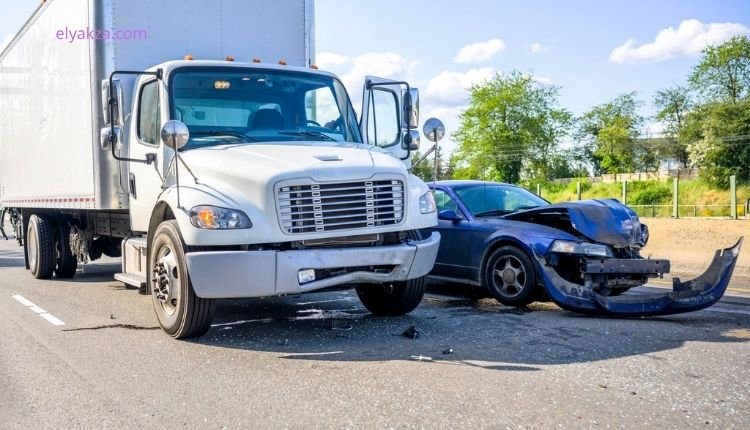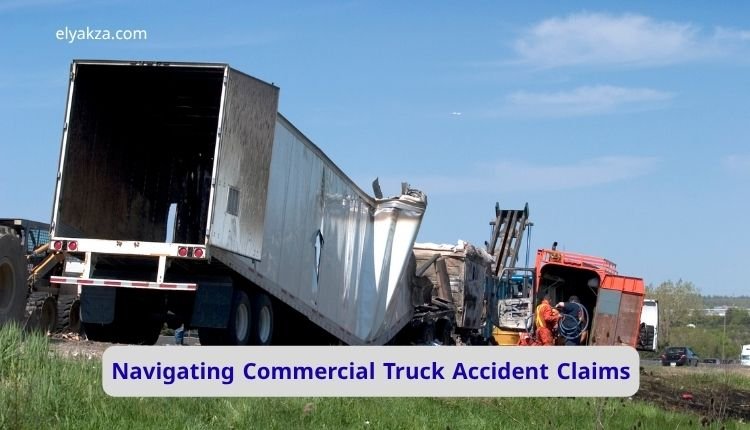A collision with a commercial truck – be it an 18-wheeler, a semi-truck, or any large rig – is a terrifying experience. Unlike a standard car accident, these incidents often result in catastrophic injuries and complex legal battles. The sheer size and weight of commercial vehicles mean that victims of truck accidents frequently suffer life-altering physical and emotional trauma.
قائمة المحتويات
If you or a loved one has been injured in such an incident, understanding the unique landscape of commercial truck accident claims is crucial.
This article delves into the intricacies of these cases, from understanding insurance policies to proving liability and maximizing your compensation. We’ll explore why these claims differ significantly from typical car accidents and highlight the critical role an experienced personal injury trial lawyer plays in securing the justice you deserve.
The Unique Challenge of Truck Accidents
While all motor vehicle accidents are serious, collisions involving large commercial trucks present a distinct set of challenges. The impact force generated by an 80,000-pound truck compared to a 3,000-pound passenger car is immense, leading to more severe injuries, extensive property damage, and often, fatalities. But beyond the physical devastation, the legal framework surrounding truck accidents is far more complex.
Unlike individual drivers, trucking companies operate under a stringent web of federal and state regulations, including those enforced by the Federal Motor Carrier Safety Administration (FMCSA). These regulations govern everything from driver hours of service and vehicle maintenance to cargo securement and insurance requirements. A violation of any of these rules can be a key factor in establishing negligence and liability.
Moreover, the parties involved can extend beyond just the truck driver and the trucking company. They might include the truck owner, trailer owner, cargo loader, freight broker, maintenance contractors, and even the manufacturer of defective parts. Untangling this web of responsibility requires specialized legal knowledge and significant investigative resources.
Understanding Insurance Coverage in Truck Accidents
One of the few “advantages” for a plaintiff in a truck accident case, if it can be called that, is the typically higher insurance coverage carried by commercial trucking operations. The FMCSA mandates that interstate commercial trucks carry a minimum of $1 million in liability insurance. This is a stark contrast to the often much lower minimums required for personal vehicle insurance policies.
While a $1 million policy might seem substantial, severe truck accident injuries can easily exceed this amount, especially when factoring in long-term medical care, lost wages, and pain and suffering. It’s also important to note that sometimes, multiple policies might apply – for instance, one for the truck’s cab and another for the trailer, or even policies held by brokers or cargo owners. An experienced attorney will meticulously investigate all potential avenues of recourse to ensure all available insurance coverage is identified and pursued.
However, having a large policy doesn’t guarantee an easy settlement. Trucking companies and their insurers are sophisticated adversaries. They will vigorously defend against claims, employing their own legal teams and resources to minimize payouts. They are not simply going to “tender” a million dollars just because a large policy exists.
“Read Also: Slash Your Car Insurance Costs“
Key Factors Determining Your Claim’s Value

Just like any personal injury case, the value of your commercial truck accident claim hinges on two primary factors: fault (liability) and damages (your injuries and losses).
- Fault: The first question any legal team or insurance adjuster will ask is: who was at fault for the crash? If the truck driver was entirely blameless and you were responsible for the collision, then, naturally, you won’t be able to recover compensation from them. Proving fault in a truck accident often involves a detailed reconstruction of the accident, analysis of witness statements, traffic camera footage, police reports, and crucially, data from the truck itself.
- Damages: Once fault is established, the focus shifts to your injuries and their impact on your life. This includes:
- Medical Injuries: What are your specific diagnoses? Do you require surgery, extensive physical therapy, or long-term medication? The severity and nature of your medical treatment are paramount.
- Loss of Enjoyment of Life: How has the accident affected your ability to participate in activities you once enjoyed? Has it impaired your hobbies, social life, or daily routine?
- Lost Wages: Have you been unable to work due to your injuries? This includes past lost earnings and future earning capacity if your injuries prevent you from returning to your previous job or working at all.
- Future Medical Costs: Will you need ongoing medical care, future surgeries, medications, or assistive devices?
- Pain and Suffering: The physical pain, emotional distress, and mental anguish caused by the accident.
- Permanency of Injury: Is your injury permanent, or will it eventually heal completely? Permanent injuries typically warrant much higher compensation than temporary ones. A diagnosis from an orthopedic doctor, neurologist, or other specialists confirming the nature and prognosis of your injuries is vital.
All these elements are meticulously documented and presented to build a compelling case for your compensation.
Proving Liability: The Role of Regulations and Discovery

One of the most powerful tools in a truck accident attorney’s arsenal is the ability to show that the truck driver or trucking company violated federal safety regulations. The FMCSA regulations and the Code of Federal Regulations (CFR) set forth stringent rules for the trucking industry. A skilled attorney will often send out a comprehensive discovery request, sometimes comprising a hundred or more items, to unearth crucial evidence.
This evidence can include:
- Driver Qualification Files: These files contain the driver’s employment history, driving records, medical certifications, drug test results, and training records. Disturbingly, litigation sometimes reveals that drivers have past convictions for drug-related offenses, yet are still hired by companies prioritizing profit over safety.
- Hours of Service Logs: Truck drivers are strictly limited in the number of hours they can drive continuously (e.g., 10 hours) before requiring a mandatory break. Violations of these rules, often due to pressure from companies to meet delivery deadlines, are a frequent cause of fatigued driving accidents.
- Vehicle Maintenance Records: Poorly maintained trucks – with worn tires, faulty brakes, or malfunctioning lights – are a serious hazard.
- “Black Box” Data: Similar to airplanes, commercial trucks are equipped with Electronic Control Modules (ECMs), often referred to as “black boxes.” These devices record critical data immediately before, during, and after a crash, including speed, braking, steering, and engine performance. Retrieving and analyzing this data is paramount.
- Drug and Alcohol Test Results: Post-accident drug and alcohol testing is mandatory for commercial drivers.
If a violation of these safety rules directly contributed to the cause of the accident, it significantly strengthens the argument for liability. Proving that the trucking company or driver disregarded safety, leading to your injuries, is a critical step towards recovering substantial damages.
“Read Also: Best Cheap Car Insurance Quotes“
Types of Injuries and Their Impact on Compensation
Commercial truck accidents can cause a wide spectrum of injuries, ranging from moderate to catastrophic. The severity and long-term implications of these injuries directly influence the amount of compensation you can receive. Common injuries include:
- Spinal Cord Injuries: From herniated discs requiring fusions to permanent paralysis, spinal injuries are devastating and often necessitate lifelong care. Procedures like epidural steroid injections, facet joint injections, radiofrequency ablations, and percutaneous discectomies are common.
- Traumatic Brain Injuries (TBIs): These can range from concussions to severe brain damage, leading to cognitive impairments, personality changes, and physical disabilities.
- Fractures and Orthopedic Injuries: Broken bones, joint dislocations (shoulders, knees, hips), and injuries to ligaments and tendons often require complex surgeries (e.g., arthroscopic procedures) and extensive physical therapy.
- Internal Organ Damage: Ruptured organs, internal bleeding, and other life-threatening internal injuries.
- Burn Injuries: Caused by vehicle fires or chemical spills.
- Psychological Trauma: Post-traumatic stress disorder (PTSD), anxiety, depression, and other emotional distress are common following such a traumatic event.
Each of these injuries has a unique trajectory of recovery, medical costs, and impact on the victim’s life. An attorney works closely with medical experts to fully document the extent of these damages, including projections for future medical needs and the non-economic impact on your quality of life.
The Importance of an Experienced Truck Accident Attorney
Given the complexities involved, attempting to navigate a commercial truck accident claim on your own is ill-advised. An experienced truck accident attorney is not just beneficial; they are essential for several reasons:
- Specialized Knowledge: They understand the nuances of FMCSA regulations, the Code of Federal Regulations, and the specific laws governing interstate commerce, which general personal injury lawyers may not.
- Resource Mobilization: They have the resources to conduct thorough investigations, hire accident reconstructionists, medical experts, and economists to build a robust case. They know precisely what discovery items to request, from driver logs to “black box” data.
- Negotiation Skills: They are accustomed to dealing with large insurance companies and their aggressive defense tactics. They can effectively negotiate for a fair settlement that truly reflects your losses.
- Litigation Preparedness: If a fair settlement cannot be reached, they are prepared to take your case to trial, presenting a compelling argument to a jury.
- Maximizing Compensation: They know how to identify all potential avenues of compensation and ensure that every element of your damages, both economic and non-economic, is properly accounted for.
Working with a skilled legal team means you can focus on your recovery while they handle the complexities of your claim, ensuring you receive the best possible medical care and legal representation.
When Negligence Goes Beyond the Driver
Sometimes, the fault in a truck accident extends beyond just the driver. Trucking companies often play a significant role in causing or contributing to collisions due to their practices. If a company prioritizes profits over safety, for instance, by pressuring drivers to violate hours-of-service rules, neglecting vehicle maintenance, or hiring unqualified drivers, they can be held directly liable.
Jurors often react strongly to cases where a trucking company’s negligence is clear. When they see that a company cut corners, allowed an unsafe driver on the road, or pushed a driver to exhaustion for financial gain, they tend to want to send a message. This desire to deter future unsafe practices can lead to larger compensation awards for the victim. These are the cases where the “bad conduct” of the company can truly sway a jury, leading to substantial verdicts for injured plaintiffs.
Real-World Examples of Successful Outcomes
The impact of having a qualified legal team on your side can be dramatic. Consider real case examples where experienced attorneys secured significant compensation for their clients:
- A Percutaneous Discectomy Case: A case involving a percutaneous discectomy (a procedure to remove part of a herniated disc) against a trucking company settled for over $500,000. This demonstrates that even common back injuries, when properly attributed to a truck company’s negligence, can lead to substantial recovery.
- A Spinal Fusion Case: In a challenging liability case, a lawsuit against a trucking company involving a spinal fusion injury settled for $2.4 million at mediation, just before trial. This highlights that even when liability is difficult to prove, a tenacious and knowledgeable legal team can achieve excellent results by uncovering critical evidence and demonstrating the full extent of the client’s damages.
These examples underscore that while liability and damages are the “big-ticket items” in any personal injury claim, the unique aspects of truck accident litigation, combined with an attorney’s expertise in navigating regulations and uncovering corporate negligence, can lead to significant settlements and verdicts.
Navigating Commercial Truck Accident Claims: the Conclusion
Being involved in a commercial truck accident is a life-altering event. The road to recovery, both physically and financially, can be long and arduous. However, understanding the unique legal landscape of commercial truck accident claims is your first step towards securing justice.
From the federal regulations governing trucking operations to the critical importance of proving fault and documenting damages, these cases demand specialized legal expertise.
If you or a loved one has been injured in a collision with a big rig, do not delay. Consulting with an experienced personal injury trial lawyer specializing in truck accidents is paramount. They will conduct a thorough investigation, identify all liable parties, navigate the complex insurance landscape, and fight tirelessly to ensure you receive the maximum compensation for your injuries and losses. Your focus should be on healing; let a dedicated legal team handle the fight for your rights.
John George is a professional writer focused on legal advice and attorney guides, offering practical and easy-to-understand content that helps readers navigate complex legal topics. His work covers various areas such as contracts, business law, family law, and consumer rights, always aiming to simplify legal concepts for everyday readers.
Through his articles, John provides step-by-step guides, insightful tips, and detailed explanations that empower readers to make informed decisions when dealing with legal matters. He bridges the gap between legal professionals and individuals seeking clarity in their legal journey.
John is committed to promoting accessible legal knowledge and believes that everyone deserves reliable information to protect their rights. His writing style combines professionalism with clarity, making his work a valuable resource for both individuals and small businesses.

